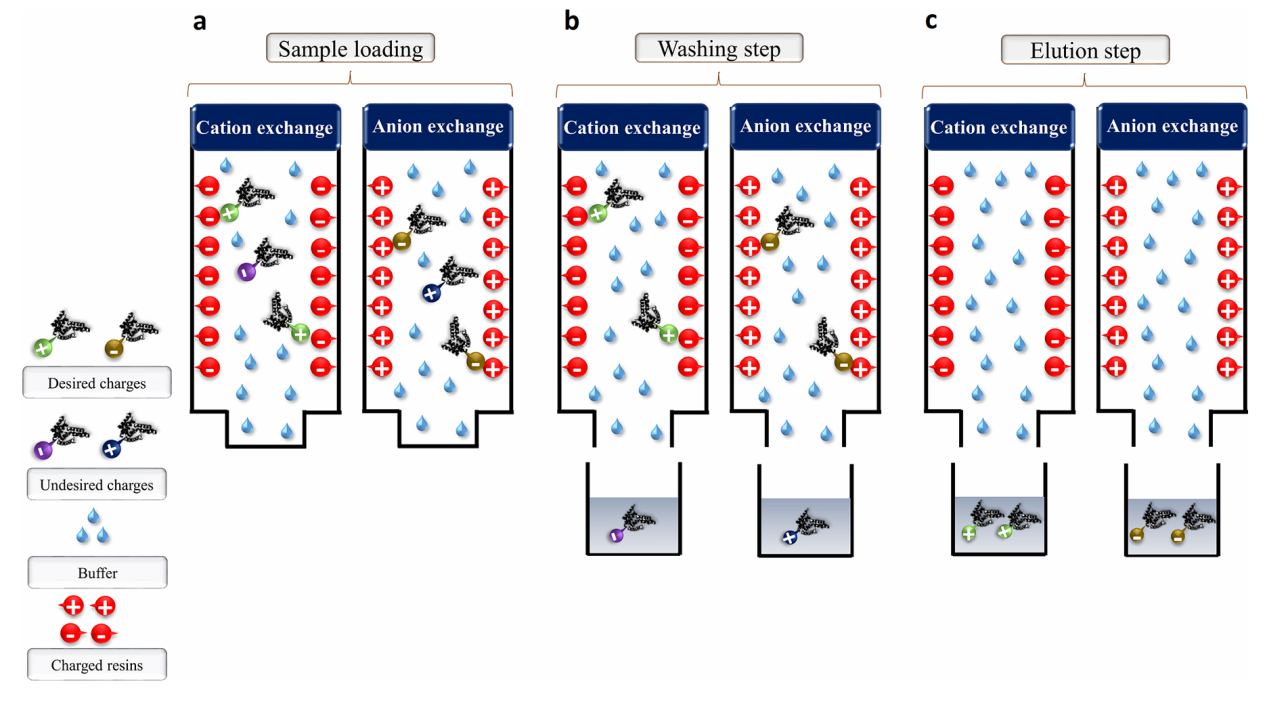SAX & SCX-Based Modified Peptide Enrichment Service
Ion exchange chromatography (IEC), including strong anion exchange (SAX) and strong cation exchange (SCX), is a charge-based separation technique widely used in protein and peptide analysis. MtoZ Biolabs offers a SAX & SCX-Based Modified Peptide Enrichment Service that selectively capture post-translationally modified (PTM) peptides. Our services integrate Ion exchange chromatography with high-resolution mass spectrometry, HPLC fractionation, and complementary immunoaffinity approaches.
Strong anion exchange (SAX) and strong cation exchange (SCX) chromatography are powerful tools for separating peptides based on their charge states, making them particularly suitable for the enrichment of phosphorylated, sulfated, and acetylated peptides, as well as other modifications that alter peptide charge. Depending on the nature of the modification, we design tailored enrichment strategies:
💠SAX Enrichment: Suitable for acidic modifications such as phosphorylation or sulfation, enabling efficient separation from non-modified peptides.
💠SCX Enrichment: Ideal for positively charged modifications, including acetylation and methylation, providing enhanced resolution of low-abundance peptides.
💠Integrated Approaches: SAX or SCX can be combined with immunoprecipitation, TiO₂ enrichment, or HILIC to achieve higher specificity and deeper coverage.
💠Advanced Detection: Enriched peptides are analyzed by LC-MS/MS, complemented by Western blotting or antibody-based validation for robust confirmation.
Technical Principles
The analysis of post-translational modifications presents a significant challenge due to their low abundance, transient nature, and complexity. Enrichment strategies are therefore essential to increase the detectability of modified peptides prior to mass spectrometry. SAX and SCX chromatography provide orthogonal separation methods that exploit differences in peptide charge states. In SAX chromatography, peptides are separated based on negative charge interactions with the resin, making this technique highly effective for modifications that increase peptide acidity, such as phosphorylation. In SCX chromatography, peptides are fractionated according to their positive charge, offering superior resolution of modifications that influence basic amino acid residues. By adjusting buffer conditions and pH gradients, both methods enable selective recovery of modified peptides with minimal contamination from unmodified species.

Mahmoudi Gomari, M. et al. Biotechnol Adv. 2020.
Figure 1. Schematic Illustration of Strong Cation Exchange Chromatography (The Left Panels) and Strong Anion Exchange Chromatography (The Right Panels)
Analysis Workflow

Sample Submission Suggestions
1. Sample Types: Cell lysates, tissue extracts, biofluids, purified proteins/peptides, or other biological samples.
2. Amount Required: At least 200 µg of total protein or equivalent peptide digest is recommended.
3. Storage Conditions: Store samples at -80°C and avoid repeated freeze-thaw cycles.
4. Shipping: Ship on dry ice to maintain integrity.
*Notes: Please contact us in advance for tailored sample preparation guidance.
Service Advantages
1. Advanced Platform: State-of-the-art SAX and SCX chromatography integrated with high-resolution mass spectrometry.
2. Comprehensive Workflow: End-to-end solutions covering enrichment, detection, quantification, and functional interpretation.
3. Professional Expertise: A team with extensive experience in PTM proteomics provides technical support and reliable data interpretation.
4. Customization: Flexible protocols tailored to project goals, modification types, and sample characteristics.
Applications
1. Signal Transduction Studies
Mapping sulfation or phosphorylation modifications to reveal regulatory nodes in cellular signaling networks.
2. Disease Mechanism Research
Profiling PTM dysregulation in cancer, neurodegeneration, cardiovascular disease, and immune disorders.
3. Biomarker Discovery
Identifying modification-specific peptide signatures that serve as diagnostic or prognostic indicators.
4. Drug Development
Supporting therapeutic development by evaluating PTM changes in response to drug treatment or environmental stimuli.
MtoZ Biolabs offers researchers a robust, customizable, and reliable modified-peptide enrichment solution for studying complex post-translational modifications. Free project evaluation, welcome to learn more details.







